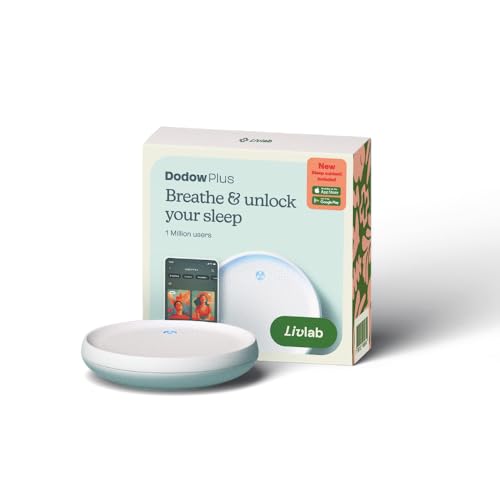Disclosure
This website is a participant in the Amazon Services LLC Associates Program, an affiliate advertising program designed to provide a means for us to earn fees by linking to Amazon.com and affiliated sites.
Anxiety can prevent you from falling asleep, staying asleep, or getting quality rest—but there are proven strategies to prevent anxiety from disrupting your sleep.
Sleep is crucial for emotional resilience, cognitive function, and physical health. Yet, for millions of people, anxiety becomes a nightly barrier to rest. According to the Anxiety and Depression Association of America, anxiety disorders affect 40 million adults in the U.S. alone—and poor sleep is one of the most common complaints.
Have you ever found yourself lying in bed, wide awake, replaying the day’s events or worrying about tomorrow? You’re not alone. Whether it’s a racing mind, tight chest, or rapid heartbeat, anxiety can make even the idea of sleep stressful.
The good news? You can take back control. From adjusting your sleep environment to using mindfulness techniques and seeking professional support, there are real, science-backed ways to calm your mind and body before bed.
Best Tools for Managing Sleep Anxiety
While lifestyle changes and coping techniques are essential, the right tools can also make a big difference. Here are three top-rated products that help prevent anxiety from disrupting your sleep:
Dodow – Sleep Aid Device
Dodow is a metronome light that guides your breathing, helping you fall asleep faster by calming the nervous system.
- Meet Dodow Plus, the enhanced version of the original Dodow, now with a…
- 💤 Lull your busy mind to sleep 💤 Let Dodow’s calming light and guided…
- 🫶 Easy, convenient, and flexible to use 🫶 Choose between an 8 or 20-minute…
Bose QuietComfort Bluetooth Earbuds
These noise-masking earbuds are designed specifically for sleep, playing soothing sounds that block out external noise and racing thoughts.
- SOUND WITHOUT COMPROMISE: Seize the day your way and defy distractions using…
- POWERFUL, PROVEN AUDIO: Get into it while you get after it, these IPX4-rated…
- SEIZE-THE-DAY STAYING POWER: These noise cancelling earbuds have wireless…
Gravity Weighted Blanket (15 lbs)
This blanket uses deep pressure stimulation to promote a feeling of calm and security, mimicking the sensation of a comforting hug.
- Optimize Your Rest: Gravity Blankets improve sleep using deep touch pressure to…
- Backed By Research: Fall asleep faster and feel more rested upon waking up with…
- High-Quality Materials: The Gravity Blanket features a premium micro-plush duvet…
How Anxiety Affects Sleep
Anxiety doesn’t just keep your mind racing—it triggers a full-body stress response that interferes with your ability to fall and stay asleep.
When you feel anxious, your brain activates the hypothalamic-pituitary-adrenal (HPA) axis, flooding your body with stress hormones like cortisol and adrenaline. These chemicals raise your heart rate, increase alertness, and prepare your body for a “fight-or-flight” response. While helpful in a dangerous situation, this reaction is counterproductive when you’re lying in bed, trying to sleep.
Here’s how anxiety disrupts your natural sleep cycle
- Delayed Sleep Onset: You lie awake, unable to “shut off” your thoughts.
- Light, Fragmented Sleep: Anxiety prevents you from entering deep, restorative sleep stages.
- Early Morning Awakenings: Worry spikes cortisol early, waking you up before you’re rested.
The Cycle of Sleeplessness and Stress
Lack of sleep increases anxiety the next day, creating a vicious cycle:
- Anxiety keeps you awake at night.
- Sleep deprivation increases irritability and worry.
- Increased worry makes it even harder to sleep the next night.
Establishing a Relaxing Nighttime Routine to Calm Anxiety
Creating a calming pre-sleep routine is one of the most effective ways to prevent anxiety from disrupting your sleep. A consistent nighttime ritual signals to your brain that it’s time to wind down, helping lower cortisol levels and engage the parasympathetic nervous system—your body’s natural “rest and digest” state.
Start with a Fixed Bedtime
Going to bed and waking up at the same time each day trains your circadian rhythm, your internal body clock, making it easier to fall asleep and stay asleep—even when you’re anxious.
Build a 30-Minute Wind-Down Window
Spend the last half hour before bed doing soothing, screen-free activities:
- Take a warm shower or bath.
- Practice light yoga or stretching.
- Read a physical book (not on a device).
- Journal your thoughts or write a gratitude list.
- Listen to calming music or a guided meditation.
Try the 4-7-8 Breathing Technique
This simple method helps calm your nervous system:
- Inhale through your nose for 4 seconds.
- Hold your breath for 7 seconds.
- Exhale slowly through your mouth for 8 seconds.
- Repeat for 4–6 cycles.
This technique slows your heart rate and quiets your mind, making it easier to drift off peacefully.
Lifestyle Changes That Naturally Reduce Nighttime Anxiety
Small daily habits can have a big impact on how anxious you feel at night. By making intentional lifestyle changes, you can prevent anxiety from disrupting your sleep and improve your overall mental well-being.
Prioritize Regular Physical Activity
Exercise reduces stress hormones and increases endorphins, your body’s natural mood elevators.
- Aim for 30 minutes of moderate activity (like walking, cycling, or swimming) at least five days a week.
- Avoid vigorous workouts within two hours of bedtime as they may be too stimulating.
Eat for Calm
Certain foods can either fuel anxiety or help reduce it:
- Eat more: Whole grains, leafy greens, berries, nuts, and foods rich in magnesium and omega-3s (like salmon).
- Limit: Caffeine, sugar, processed foods, and alcohol, all of which can aggravate anxiety symptoms and interfere with sleep quality.
Reduce Screen Time at Night
The blue light emitted from phones, tablets, and TVs disrupts melatonin production and keeps your brain alert.
- Try to power down all screens at least one hour before bedtime.
- Use blue light filters or wear blue light-blocking glasses if you must use screens in the evening.
Get Sunlight During the Day
Sunlight helps regulate your circadian rhythm and boosts serotonin, a neurotransmitter that stabilizes mood.
- Aim for 20–30 minutes of natural sunlight exposure daily, especially in the morning.
Making these lifestyle shifts isn’t about overnight perfection—it’s about building habits that support a calmer body and mind, reducing the intensity and frequency of anxiety spikes at night.
Mindfulness and Cognitive Techniques to Quiet a Racing Mind
When your mind won’t stop spinning at night, mindfulness and cognitive behavioral techniques can help shift your thoughts from anxious loops to calm presence. These tools train your brain to disengage from worry and focus on the present moment—essential for restful sleep.
Practice Mindfulness Meditation
Mindfulness involves observing your thoughts without judgment. Over time, it can reduce anxiety by strengthening areas of the brain responsible for emotional regulation.
- Start with 5–10 minutes of breath-focused meditation before bed.
- Apps like Headspace, Calm, or Insight Timer offer guided sleep meditations specifically designed to reduce nighttime anxiety.
Use Progressive Muscle Relaxation (PMR)
PMR involves tensing and relaxing each muscle group to release physical tension—a major trigger for anxious thoughts.
- Begin at your feet and move upward: tense for 5 seconds, then release.
- Focus on the contrast between tightness and relaxation.
Try Thought Reframing
If your mind is spiraling with “what if” scenarios, use Cognitive Behavioral Therapy (CBT) techniques like:
- Identify the anxious thought.
- Challenge its validity (Is it likely? Is there evidence for or against it?).
- Replace it with a more rational or calming perspective.
The “Worry Window” Technique
Designate 15 minutes earlier in the day as your “worry window.”
- During this time, write down all your worries.
- Once done, mentally shelve them—you’ve addressed them and they don’t belong in bed with you.
When to Seek Professional Help for Sleep Anxiety
If anxiety continues to disrupt your sleep despite lifestyle changes, relaxation techniques, and routine adjustments, it may be time to seek professional support. Persistent sleep anxiety could be a sign of an underlying mental health condition that requires specialized treatment.
Signs You Might Need Professional Help
- You struggle to fall asleep or stay asleep most nights of the week.
- Sleep problems persist for more than one month.
- Your anxiety interferes with your daily functioning, work, or relationships.
- You experience panic attacks, frequent nightmares, or overwhelming dread at bedtime.
- You’ve tried multiple self-help strategies with little or no improvement.
Treatment Options That Work
- Cognitive Behavioral Therapy for Insomnia (CBT-I): A gold-standard treatment that addresses both anxiety and sleep issues by changing unhelpful sleep habits and thought patterns.
- Medication: Short-term use of anti-anxiety medication or sleep aids may be recommended by your doctor. Always follow professional guidance to avoid dependency.
- Therapy/Counseling: Working with a licensed therapist can help you explore the root causes of your anxiety and develop long-term coping strategies.
- Sleep Clinics: If your sleep issues may stem from a physical disorder (like sleep apnea), a sleep specialist can run diagnostic tests and provide tailored interventions.
Conclusion
Anxiety and sleep don’t have to be enemies. By understanding how anxiety affects your body, creating a calming bedtime routine, making mindful lifestyle changes, and using proven cognitive techniques, you can prevent anxiety from disrupting your sleep. It takes consistency, but the rewards—better rest, improved mood, and greater resilience—are worth the effort.
Start small: breathe deeply, power down screens, and create a nightly ritual that brings you peace. Your body and mind will begin to associate bedtime with safety, not stress. You deserve restful sleep—and with the right tools and support, it’s absolutely possible.
FAQs
Why does anxiety get worse at night?
Anxiety tends to worsen at night because distractions are fewer and the brain is free to wander. Without daytime tasks to keep you busy, your mind may focus more on stressors or future worries, triggering a fight-or-flight response that interferes with sleep.
Can sleep anxiety cause insomnia?
Yes. Sleep anxiety often leads to insomnia, including trouble falling asleep, frequent nighttime awakenings, and early morning waking. The fear of not sleeping well creates performance anxiety around sleep, making the problem worse over time.
What are quick fixes if I feel anxious at bedtime?
Try deep breathing exercises, progressive muscle relaxation, or a short mindfulness meditation. Journaling or writing a to-do list before bed can also offload anxious thoughts.
Should I take medication for sleep-related anxiety?
Medication can be helpful short-term, but it’s not a cure. It’s best used under the supervision of a healthcare provider alongside therapy, especially Cognitive Behavioral Therapy for Insomnia (CBT-I), which targets the root of the problem.
Is it normal to wake up anxious in the middle of the night?
Yes, especially for those with chronic stress or anxiety disorders. Elevated cortisol levels during the night can trigger early morning awakenings with anxious thoughts or even panic attacks.



